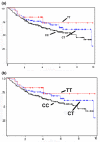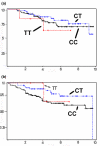Association between manganese superoxide dismutase promoter gene polymorphism and breast cancer survival
- PMID: 16859522
- PMCID: PMC1779484
- DOI: 10.1186/bcr1532
Association between manganese superoxide dismutase promoter gene polymorphism and breast cancer survival
Abstract
Background: Manganese superoxide dismutase (MnSOD) plays a critical role in the detoxification of mitochondrial reactive oxygen species, constituting a major cellular defense mechanism against agents that induce oxidative stress. A genetic polymorphism in the mitochondrial targeting sequence of this gene has been associated with increased cancer risk and survival in breast cancer. This base pair transition (-9 T > C) leads to a valine to alanine amino acid change in the mitochondrial targeting sequence. A polymorphism has also been identified in the proximal region of the promoter (-102 C>T) that alters the recognition sequence of the AP-2 transcription factor, leading to a reduction in transcriptional activity. The aim of our study was to investigate possible associations of the -102 C>T polymorphism with overall and relapse-free breast cancer survival in a hospital-based case-only study.
Materials and methods: The relationship between the MnSOD -102 C>T polymorphism and survival was examined in a cohort of 291 women who received chemotherapy and/or radiotherapy for incident breast cancer. The MnSOD -102 C>T genotype was determined using a TaqMan allele discrimination assay. Patient survival was evaluated according to the MnSOD genotype using Kaplan-Meier survival functions. Hazard ratios were calculated from adjusted Cox proportional hazards modeling. All statistical tests were two-sided.
Results: In an evaluation of all women, there was a borderline significant reduction in recurrence-free survival with either one or both variant alleles (CT + TT) when compared with patients with wild-type alleles (CC) (odds ratio, 0.65; 95% confidence interval, 0.42-1.01). When the analysis was restricted to patients receiving radiation therapy, there was a significant reduction in relapse-free survival in women who were heterozygous for the MnSOD -102 genotype (relative risk, 0.40; 95% confidence interval, 0.18-0.86). Similarly, when the homozygous and heterozygous variant genotypes were combined, there remained a significant reduction in relapse-free survival in this group (hazard ratio, 0.42; 95% confidence interval, 0.20-0.87).
Conclusion: The MnSOD -102 variant allele appears to be associated with an improved recurrence-free survival in all patients, and more dramatically in subjects who received adjuvant radiation therapy.
Figures


References
-
- Jemal A, Murray T, Ward E, Samuels A, Tiwari RC, Ghafoor A, Feuer EJ, Thun MJ. Cancer statistics, 2005. CA Cancer J Clin. 2005;55:10–30. - PubMed
-
- World Health Organization . The World Health Report. Geneva: World Health Organization; 1997.
-
- American Cancer Society I . Cancer Facts and Figures 2005. Chicago, IL; 2005.
-
- Easton D, Ford D, Peto J. Inherited susceptibility to breast cancer. Cancer Surv. 1993;18:95–113. - PubMed
Publication types
MeSH terms
Substances
Grants and funding
LinkOut - more resources
Full Text Sources
Medical
Research Materials

